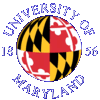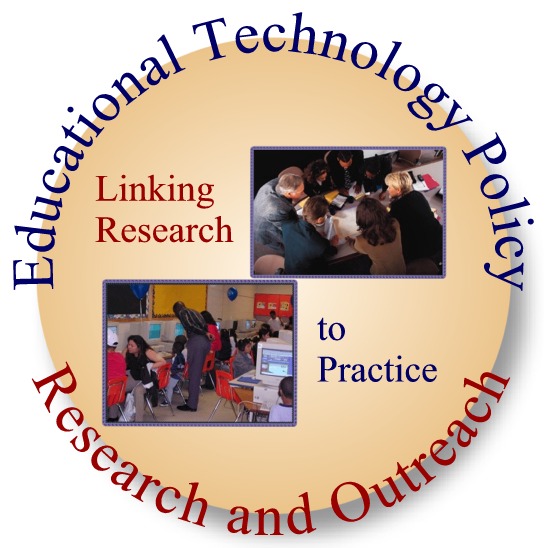Cyberethics, Cybersafety, & Cybersecurity - C3 Conference
For Professional Educators
|
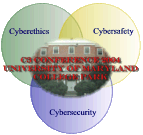 |
June 17-18, 2004
Key Note Speakers
Rodney Petersen
The 3C’s in Schools: Application of the Learning Continuum
Speaker Bio
Rodney Petersen is a Policy Analyst with EDUCAUSE and the Project
Director for the EDUCAUSE/Internet2 Computer and Network Security
Task Force. He is the co-editor of a recent book on "Computer
and Network Security in Higher Education." He was formerly
the Director of IT Policy and Planning in the Office of the Vice
President and Chief Information Officer at the University of Maryland.
He was the founder of Project NEThics at the University of Maryland
- a group whose mission is to ensure responsible use of information
technology through user education and enforcement of acceptable
use guidelines. He received his law degree from Wake Forest University.
His research and writing interests include information security,
copyright ownership and use of copyrighted materials, privacy and
fair use information practices, censorship and freedom of speech,
and institutional policy development for the ethical and appropriate
use of information technology in higher education.
Presentation
Awareness, training, and education are part of the learning
continuum that helps foster a “culture of security”
where every individual and organization recognizes their responsibilities.
According to the White House, “Securing cyberspace is an extraordinarily
difficult strategic challenge that requires a coordinated and focused
effort from our entire society – the federal government, state
and local governments, the private sector and the American people.”
The National Cyber Security Alliance is implementing one of the
priorities in the National Strategy to Secure Cyberspace by promoting
a national awareness program to empower all Americans to secure
their own parts of cyberspace, including homes and schools. This
keynote address will describe the application of the learning continuum
to the issues of cyberethics, cybersecurity, and cybersafety.
Dr. Vic Maconachy
The Critical Role of Education in Information Assurance
Speaker Bio
Dr. Maconachy currently serves as the program manager of the National
Information Assurance Education and Training Program (NIETP) within
the National Security Agency. He is implementing a multidimensional,
interagency program which provides direct support and guidance to
the services, major DoD components, Federal agencies and the greater
national Information Infrastructure. This program fosters the development
and implementation of Information Assurance training programs, as
well as graduate and undergraduate education curricula. In this
capacity he serves on several national level government working
groups, as well as in an advisory capacity to several universities.
In this position, Dr. Maconachy is the principal architect for several
national Information Assurance training standards in the classified
community, which are developed by the Awareness, Training and Education
Working Group of the Committee for National Security Systems. Dr.
Maconachy was appointed by The White House to Co-chair of the Critical
Information Coordination Committee for Personnel and Training. This
Committee prepared the personnel and training portion of The President’s
National Plan for Information Systems Protection (issued in January,
2000). On March 1, 2002, Dr. Maconachy was appointed to chair the
Education Standing Committee of The Presidents’ CIP Board.
In July 2001, Dr. Maconachy’s program was named as Executive
Agent for The Department of Defense-wide Information Assurance Scholarship
Program. Dr. Maconachy is the recipient of the prestigious Department
of Defense Meritorious Service Award.
Presentation
In today's cyber environment it is increasingly clear that
protecting critical information infrastructures requires three countermeasures
all working in concert: Technology, Operations and People. The people
part is the most critical, and is recognized by The President as
a national priority in his National Strategy for Cyber Protection.
We will explore what can and needs to be done at the k-12 as well
as higher education arenas.
Speakers/Panelists
Property Rights and Copyright Issues
Amy
Ginther, Coordinator, Policy Development and Education and Project
NEThics
Amy’s responsibilities at Project
NEThics include coordinating responses to incidents of computing
resources misuse in consultation with the Project NEThics Associates,
and promoting the acceptable use of computing resources through
outreach to the campus community. She is also charged with identifying
and researching information technology policy issues and working
to develop, draft and implement IT policies.
Amy has a Master's degree in College Student
Personnel Services in Higher Education from the University of Vermont,
and a Bachelor's degree in journalism from Marquette University.
She is currently a doctoral candidate in the College Student Personnel
Administration program at the University of Maryland.
Prior to working for Project NEThics, Amy
worked for the Office of Judicial Programs and Student Ethical Development
at the University of Maryland as the Assistant Director for Academic
Integrity. Before coming to Maryland, she served in various roles
in residential life departments at Carnegie Mellon University, Mankato
State University, and the University of California-Davis.
Effective Security Practices Panel:
Gerry Sneeringer has been haunting the halls
of the Office of Information Technology at the University of Maryland,
College Park for the past 20 years. During that time, he pulled
help desk duty, performed application programming, UNIX cluster
administration, network operations and engineering, and a tour as
the head of the campus network. In his current manifestation, Gerry
serves as the University's I.T. Security Officer and manages the
University's computer security group. During his tenure with the
University, he found time to earn a bachelors degree in computer
science and is a Certified Information Systems Security Professional.
Adrianna Abate
is the Chief Information Technology Officer for Howard County Public
School System, in Howard County MD, consisting of 48,000 students.
Adrianna oversees HCPSS’ WAN, LANs, and Technology Service
Center, providing network and desktop integration services and repair
to 69 schools and 6600 staff. She also coordinates infrastructure/network
and construction projects that include vendors and subcontractors.
Adrianna is also responsible for email and digital security, as
well as AV repair. Before coming to HCPSS, she was the Customer
Support Manager and Senior Network Engineer, at SIGNAL Corporation,
in Fairfax, VA, providing IT Support Services to the U.S. Senate
and Email Migration at the Federal Energy Regulatory Commission.
Cynthia Mason-Posey has been an Associate Professor,
in Computer Information Systems, at Prince George’s Community
College for the past three years. Prior to serving as a professor,
she served as the college's network manager for three years. Cynthia
currently teaches introduction to networking, UNIX system administration,
advanced Novell NetWare operating system, Cisco Network Academy
courses, and various credit and noncredit computer networking courses.
She also serves as the college's Regional Cisco Academy main contact.
CyberCrime: Educator Implications—What we should all
know
Donald Cox has been a Police Officer since 1994,
and has served as a Detective since 2002. Don specializes in Computer
Forensics, Investigation of computer crime, computer fraud and computer
abuse & misuse. He also serves as a trainer to others on how
to initiate an investigation & secure the evidence (computers
and related media). Currently, he is a deputized U.S. Marshal, working
with the Secret Service – Electronic Crimes Task Force –
Washington Field Office. He also serves as a mentor to officers/detectives
from other Law Enforcement organizations in the process of completing
their Certified Forensic Examiner Certification (CFCE).
David Foster
graduated from Colgate University in 2001 with a degree in Psychology
and Economics. He received his MA in Criminology & Criminal
Justice from University of Maryland in 2004, and is currently pursuing
a doctorate at the same institution. His research interests include
organized crime, computer crime, and drug abuse. He previously worked
as a research assistant at the Center for Substance Abuse Research
(CESAR) on campus, as well as a teaching assistant for various introductory
level classes in the BSOS/Criminology and Criminal Justice Department.
David will pursue a career in Federal law enforcement after completion
of his doctorate program.
Day 2
Friday, June 18th, 2004
Panel: Educator Awareness on Issues of Public Safety; Rights
and Responsibilities; & Academic Integrity K-12 & IHE
Amy Ginther’s
responsibilities at Project NEThics include coordinating responses
to incidents of computing resources misuse in consultation with
the Project NEThics Associates, and promoting the acceptable use
of computing resources through outreach to the campus community.
She is also charged with identifying and researching information
technology policy issues and working to develop, draft and implement
IT policies.
Amy has a Master's degree in College Student Personnel Services
in Higher Education from the University of Vermont, and a Bachelor's
degree in journalism from Marquette University. She is currently
a doctoral candidate in the College Student Personnel Administration
program at the University of Maryland.
Prior to working for Project NEThics , Amy
worked for the Office of Judicial Programs and Student Ethical Development
at the University of Maryland as the Assistant Director for Academic
Integrity. Before coming to Maryland, she served in various roles
in residential life departments at Carnegie Mellon University, Mankato
State University, and the University of California-Davis.
Andrea Goodwin is the Associate Director for Student
Conduct in the Office of Judicial Programs and Student Ethical development
at the University of Maryland. Andrea's responsibilities include
overseeing the academic integrity process at the University of Maryland,
advising the Student Honor Council, and providing outreach and education
to faculty, staff and students about academic integrity. Andrea
has a Master's degree in Higher Education Administration from Syracuse
University and a Bachelor's degree from the School of Management
at Syracuse. She is currently a doctoral candidate in Education
Policy Planning and Leadership at the University of Maryland.
Presentation & Panel: FERPA & other Federal Law Implications
Dan Symonds is the Assistant Registrar in the
Office of the Registrar at the University of Maryland. Among other
responsibilities, Dan oversees the management and security of the
University's academic records and overall student information. Acting
as one of the institution's primary information gatekeepers, he
has extensive experience in the application of Family Educational
Rights and Privacy Act (FERPA) and student privacy rights. Dan has
spoken on the topic of FERPA at a number of conferences across the
country and has helped develop the University's online FERPA tutorial,
nationally recognized as a template for communicating FERPA at post-secondary
institutions.
Paulette Robinson is Assistant Director, Teaching
and Learning Support for the Office of Instructional Technology
at UMCP. She consults on distance education technology, strategic
planning, student services, web-based course management systems,
faculty development training, instructional design, assessment and
evaluation of on-line learning environments . Previously she was
an Assistant Professor at Towson University where she taught courses
on using information effectively in education, instructional development,
web-based Instruction and distance education
Plagiarism in the 21st Century: Paper Mills, Cybercheating,
and Internet Detectives in the Electronic Age
Davina Pruitt-Mentle, Ed
Tech Outreach, COE, UMCP
Davina serves as Director of Educational Technology
Outreach for the College of Education at the University of Maryland.
As Director, she provides COE graduate courses, and coordinates
other training, conferences, and information sessions on IT integration
and digital fluency for education institutions and state and federal
agencies. Davina has a M. Ed. in Secondary Curriculum, and a Bachelor's
degree in Biochemistry from Virginia Tech. She is currently completing
her doctorate in Educational Technology Policy, in the Educational
Policy and Leadership program at the University of Maryland. Her
research and writing interests include Technology Integration, Exploring
How Technologies Both Necessitate and Facilitate Deep Changes in
the Ways Teachers Can Think, Learn, and Teach, Distance Learning,
Cyberethics, Cybersecurity and Cybersafety for the Educational Community,
Digital and Urban Divide, and Policy Analysis and Development for
the Ethical and Appropriate Use of Information and Communication
Technology in the K-16 arena.
Assessing Education: IT Access for ALL Students
MDTAP
Mike Leone, IT Project Coordinator for MD TAP
Lori Mark land, Loan Program and IT Specialist
Michael Leone is the IT Project Coordinator for
the Maryland Technology Assistance Program, a cooperative service
of the Governor's Office for Individuals with Disabilities. Michael
Leone acts as the main contact for the IT Accessibility Project
and is charged with coordinating trainings, conferences, and information
sessions on incorporating IT accessibility for education institutions
and state agencies. Michael also works directly with various agencies,
organizations, and companies to provide one-on-one technical assistance
for achieving IT accessibility. Michael Leone has extensive knowledge
of both assistive technology and information technology, and has
a breadth of experience advocating on behalf of individuals with
disabilities for greater access to information technology.
Lori Markland is the Loan Program and IT Specialist
for the Maryland Technology Assistance Program, a cooperative service
of the Governor's Office for Individuals with Disabilities. Lori
Markland oversees the IT Accessibility Project and works directly
with state agencies and education institutions to advocate and educate
on behalf of IT accessibility. Lori has provided extensive training
on making distance learning curriculum content accessible and has
developed a number of materials, resource items, and workstations
on behalf of IT accessibility within the education arena. Lori has
also traveled across the state providing sessions at various state-wide,
regional, and national education conferences.
Presented by
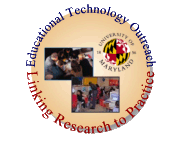
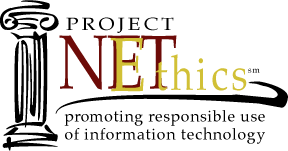
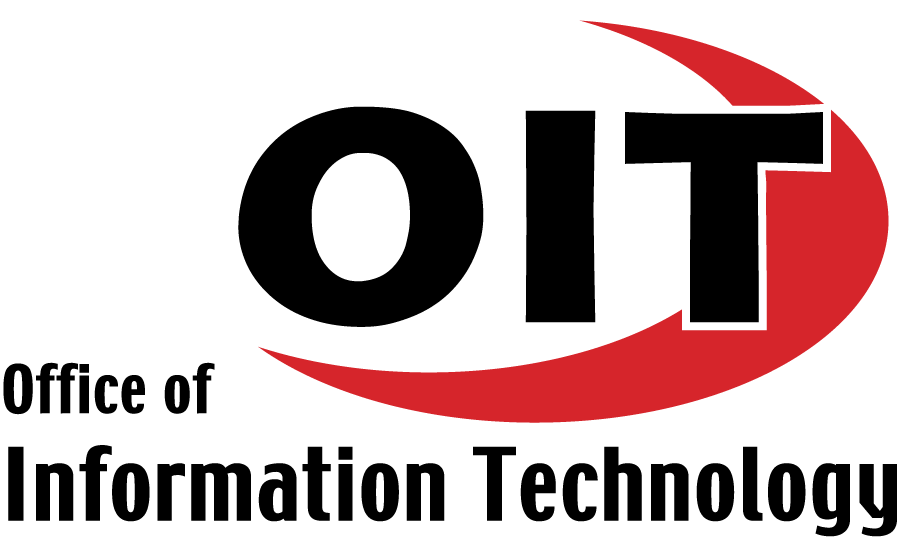


|
